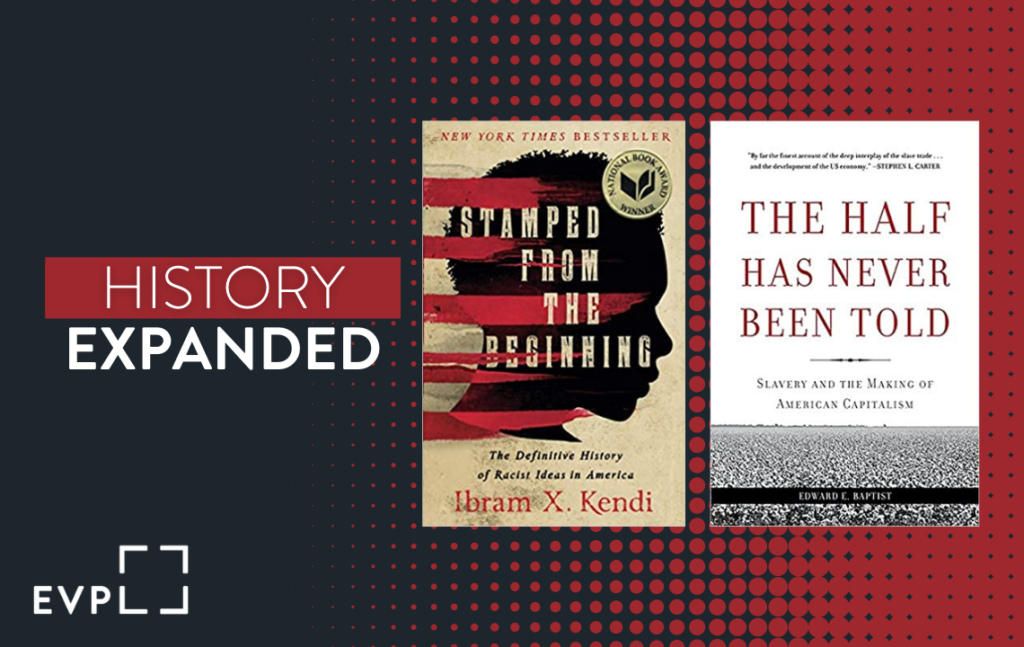Read deeper into American history
My history classes in school touched very lightly on some of the grim aspects of US History. It seemed like the first semester of US History always ended before the Civil War, and somehow the second semester picked up afterward. Slavery was acknowledged but only as a bad thing we don’t do anymore. Civil rights were too long in coming to folks with darker skin, but the 1950s and 1960s protests had taken care of that, and now, all was well.

Much too late in my adult life I began to understand that there were details and truths that had been left out, glossed over, or flat out misrepresented. Two books I’ve read recently with a local book group have given me a lot of information to fill those gaps.
The first, Stamped From the Beginning: The Definitive History of Racist Ideas in America, by Ibram X. Kendi, goes back to the first time that “race” was invented as a concept and how it developed as the empires of the day saw opportunities for power and resources available to them through the buying and selling of people as slaves. Then, as slavery was brought to the land that would become the United States, the lives and the work of these enslaved folks became fully entwined in the building and creation of the new country. Kendi provides for a division of responses to slavery as segregationist, assimilationist, and anti-racist, and his definitions of those terms, and how they shifted my perspective on US history, as well as current events, has been striking.
The second book, The Half Has Never Been Told: Slavery and the Making of American Capitalism, by Edward E Baptist, tells the history from more of an economic standpoint, while tying the story to individuals’ stories from those times. Many of the personal stories were among those collected by the WPA Writer’s Project that collected oral histories from those who had grown up around slavery. The economic information makes clear that slavery was not just a tradition on a few cotton plantations but a widespread business practice that included banks issuing mortgages on enslaved people, record keeping of just how much whipping and torture had to happen to get the most work from the enslaved, and a movement on the East Coast from a focus on farming to a breeding of enslaved people to sell to the newer, larger plantations in Alabama, Mississippi, and Louisiana. This unpaid work drove the US economy for years including for businesses, mills, and banks in the North. Baptist’s ability to entwine the economic factors with the stories of real people makes the story compelling.
These books are heavy in both subject matter and in heft – they are each over 500 pages long, so reading them is a commitment, and sometimes difficult. They are worth it for the broadened perspective they offer. One member of my book group recently said she was just starting Maya Angelou’s memoir, I Know Why the Caged Bird Sings. She discovered that she can appreciate depths and layers to the story that she would have missed before she had read and understood these histories that contribute to a more inclusive understanding of United States history.
Stamped from the Beginning is available at EVPL in print, eBook, and eAudiobook. There is also a version for teens and young adults adapted by Jason Reynolds called Stamped.
The Half has Never Been Told is available at EVPL in print, eBook, and eAudiobook.

Nancy Higgs
With 8 locations throughout Vanderburgh County, EVPL is ready to discover, explore, and connect WITH you! We encourage you to uncover new things, revisit old favorites, and to engage with us along the way.
200 SE Martin Luther King Jr. Blvd
Evansville, Indiana 47713
Administration: ceo@evpl.org
Card & Account: circulation@evpl.org
Feedback & Ideas: marketing@evpl.org



